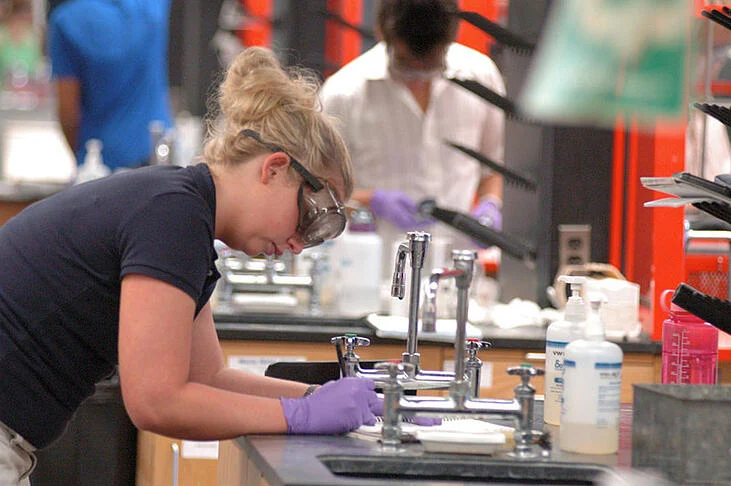On this page
1. Review organic chem basics before the first class.

Maria Sperduto, a Dartmouth College junior, suggests that a little work ahead of time will make your life easier. “Prepare yourself for the rigor and intensity of the class, and if the teaching staff recommend a book, go through the entire book and do all of the exercises. This will help you get used to looking at something that scares you and looks entirely foreign. You will be in that situation many times throughout the summer.”
Tip: Preetha Iyengar, a junior at Washington University in St. Louis, read Organic Chemistry as a Second Language I. “I did not have a strong background in chemistry, so reviewing basics and getting a little exposure to new material gave me confidence coming into the course.”
2. Make organic chem your priority.
Twelve-year veteran teaching assistant Peter Hamel offers a fair warning: “Expect it to be a full-time job and then some.”
Tip: Sperduto approached organic chem with the same mindset as she would training for a sport. “You are training for success in this class! You need to warm up (draw mechanisms, put diagrams in your room, make notecards), work hard while you’re at practice (always pay very close attention in lecture), and cross-train (do all of the problems and work with your teaching assistant).”
3. Ask a lot of questions.

The key is to stay focused. Nick Sikaczowski, who completed organic chem at Harvard Summer School while enrolled in a premed program at Northwestern, says, “Every student is going to be rattled by a difficult exam at some point (even if they don’t show it). Stay focused on your goals and how doing well in organic chemistry will help you reach them.”
“We love the course, we love the students, we love the material, and we are here to help,” says Hamel. “The TAs teach sections every day, and we make sure that time is useful to students. In addition, we staff a help room where students can get their questions answered.”
Tip: One way to organize “the fire hydrant of information” you’ll cover, as Sikaczowski put it, is to color-code your work. Sperduto suggests colored pens. “Expect to see many of them! The successful people have various methods of categorizing information as they come across it during lecture. I used different colored markers to signify notecard material, important helpful information, and things that were unclear.”
Hamel points out, “What we can’t do is just open up the students’ heads and pour in the knowledge. Try to work out a problem on your own. When you hit a roadblock, look for several ways around it. If you just seek out the ‘right’ answer every time without first examining the problem from various perspectives, then you really only learn to recognize correct answers, but you will fail when asked to generate correct answers of your own accord.”
4. Form study groups.
In line with her training mindset, Sperduto says, “If possible, work in teams. Fostering working friendships with your peers will be helpful if you need a motivational boost to keep cranking out problems or do another practice exam. I made friends that I will have for the rest of my life. Be inspired by the brilliant minds around you!”
5. Learn from your mistakes.
Recalls Sperduto, “I ruined a lab by breaking a glass pipette in our solution. But I worked with my lab partner and our TA in an attempt to continue. When we could not anymore, we looked to our peers’ labs to learn what should have happened. I was absolutely horrified, but it was not a failure of a lab! If you do your best, despite your errors, you will learn what you are supposed to learn.”
6. Don’t simply memorize; seek to understand.
“There is a lot of memorization, but one of your jobs as a student is to draw correlations and organize the information,” adds Sikaczowski.
Tip: “Stay focused on why reactions are happening (hint: pH, electrostatic forces, and sterics), as well as the function of the reagents (nucleophiles, electrophiles, oxidizing agents, reducing agents, acids, and bases),” suggests Sikaczowski.
Iyengar recalls the moment when everything clicked. “I was trying to memorize 11 basic reactions for the first exam, but I kept getting them mixed up. Then I had my eureka moment that all 11 reactions were just different versions of the same process of electrons movement. I couldn’t believe how easy it was after that! Understanding the molecular orbital theory made chemistry interesting and fun! It was like a little puzzle every time different things tried to react. Instead of memorizing, I was actually understanding the material and applying it.”
7. Give yourself the credit you deserve.
While you’re in the thick of it, the seven weeks may seem neverending, but there’s hope for you yet. “You will probably work harder than you might anticipate, but at some point, you’ll feel proud by how much you can absorb in so short a time period,” says Sam Miller.
“At some point, I was in a pharmacy, and I started to recognize different prescriptions and could picture their chemical structures. Now I’m in the midst of studying for the MCAT, and I feel as though I at least recognize, if not feel comfortable, with all the organic chemistry material.”
Share your tips and advice in the comments below!
Additional organic chem resource
- Organic Chemistry: Reactions and Mechanisms iPad app and wall posters, created by Nick Sikaczowski

